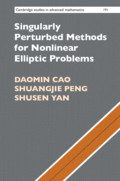This paper deals with the following fractional elliptic equation with critical exponent
 \[ \begin{cases} \displaystyle (-\Delta )^{s}u=u_{+}^{2_{s}^{*}-1}+\lambda u-\bar{\nu}\varphi_{1}, & \text{in}\ \Omega,\\ \displaystyle u=0, & \text{in}\ {{\mathfrak R}}^{N}\backslash \Omega, \end{cases}\]
\[ \begin{cases} \displaystyle (-\Delta )^{s}u=u_{+}^{2_{s}^{*}-1}+\lambda u-\bar{\nu}\varphi_{1}, & \text{in}\ \Omega,\\ \displaystyle u=0, & \text{in}\ {{\mathfrak R}}^{N}\backslash \Omega, \end{cases}\] $\lambda$,
$\lambda$,  $\bar {\nu }\in {{\mathfrak R}}$,
$\bar {\nu }\in {{\mathfrak R}}$,  $s\in (0,1)$,
$s\in (0,1)$,  $2^{*}_{s}=({2N}/{N-2s})\,(N>2s)$,
$2^{*}_{s}=({2N}/{N-2s})\,(N>2s)$,  $(-\Delta )^{s}$ is the fractional Laplace operator,
$(-\Delta )^{s}$ is the fractional Laplace operator,  $\Omega \subset {{\mathfrak R}}^{N}$ is a bounded domain with smooth boundary and
$\Omega \subset {{\mathfrak R}}^{N}$ is a bounded domain with smooth boundary and  $\varphi _{1}$ is the first positive eigenfunction of the fractional Laplace under the condition
$\varphi _{1}$ is the first positive eigenfunction of the fractional Laplace under the condition  $u=0$ in
$u=0$ in  ${{\mathfrak R}}^{N}\setminus \Omega$. Under suitable conditions on
${{\mathfrak R}}^{N}\setminus \Omega$. Under suitable conditions on  $\lambda$ and
$\lambda$ and  $\bar {\nu }$ and using a Lyapunov-Schmidt reduction method, we prove the fractional version of the Lazer-McKenna conjecture which says that the equation above has infinitely many solutions as
$\bar {\nu }$ and using a Lyapunov-Schmidt reduction method, we prove the fractional version of the Lazer-McKenna conjecture which says that the equation above has infinitely many solutions as  $|\bar \nu | \to \infty$ .
$|\bar \nu | \to \infty$ .















